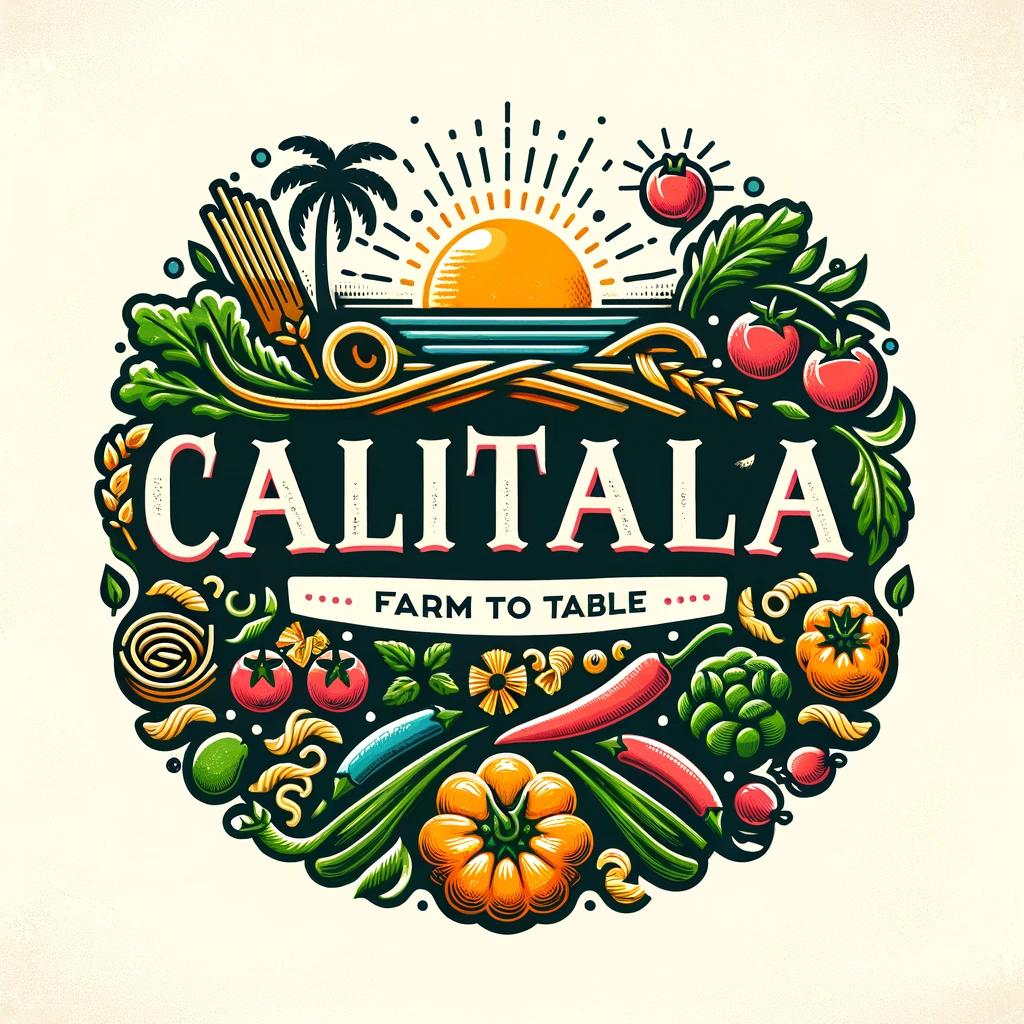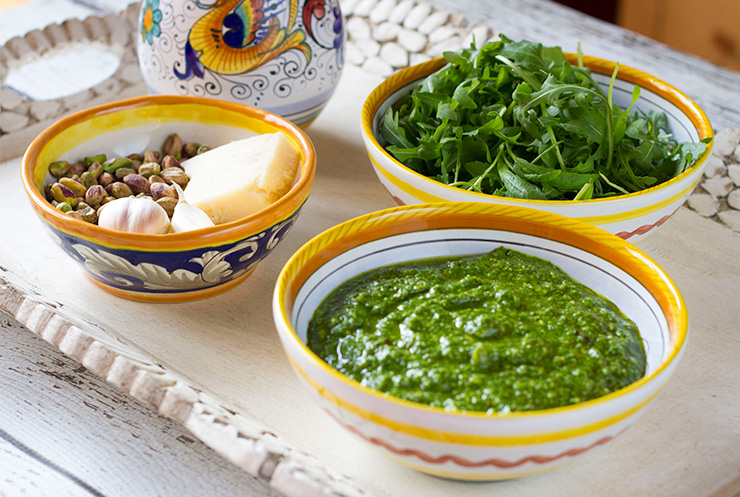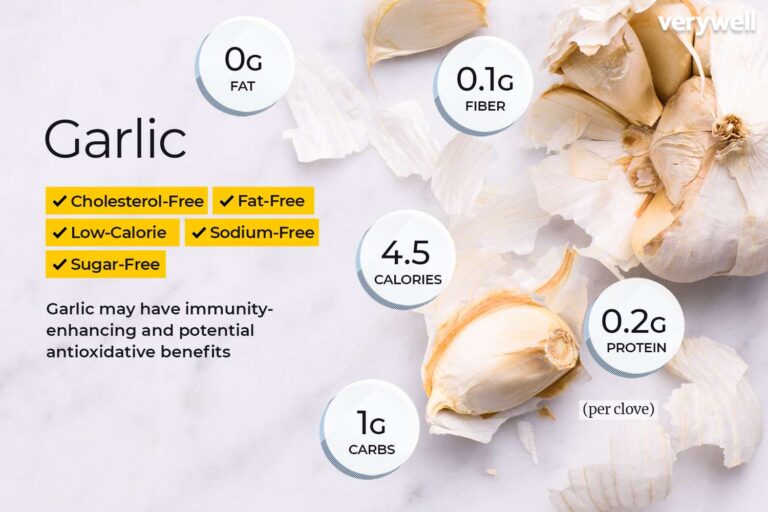The Mediterranean diet has long been celebrated for its vibrant flavors, health benefits, and diverse culinary influences. In this guide we will uncover if Is Mediterranean food Italian?
Among the rich tapestry of Mediterranean cuisine, Italian food stands out as one of the most popular and beloved worldwide.
But to fully appreciate the complexity and breadth of Mediterranean food, it’s essential to explore how Italian cuisine fits within this broader category and what distinguishes it from its regional neighbors.

What nationality is Mediterranean food?
Mediterranean food isn’t tied to just one nationality; it’s a vibrant mix of flavors from a bunch of countries lounging around the Mediterranean Sea. We’re talking a culinary party with guests from Italy, Spain, Greece, France, and parts of the Middle East and North Africa. Each region brings its own dishes and ingredients to the table, creating a diverse and flavorful mix. So, when you munch on Mediterranean food, you’re basically going on a flavor tour around the Mediterranean coast. Pretty cool, huh?
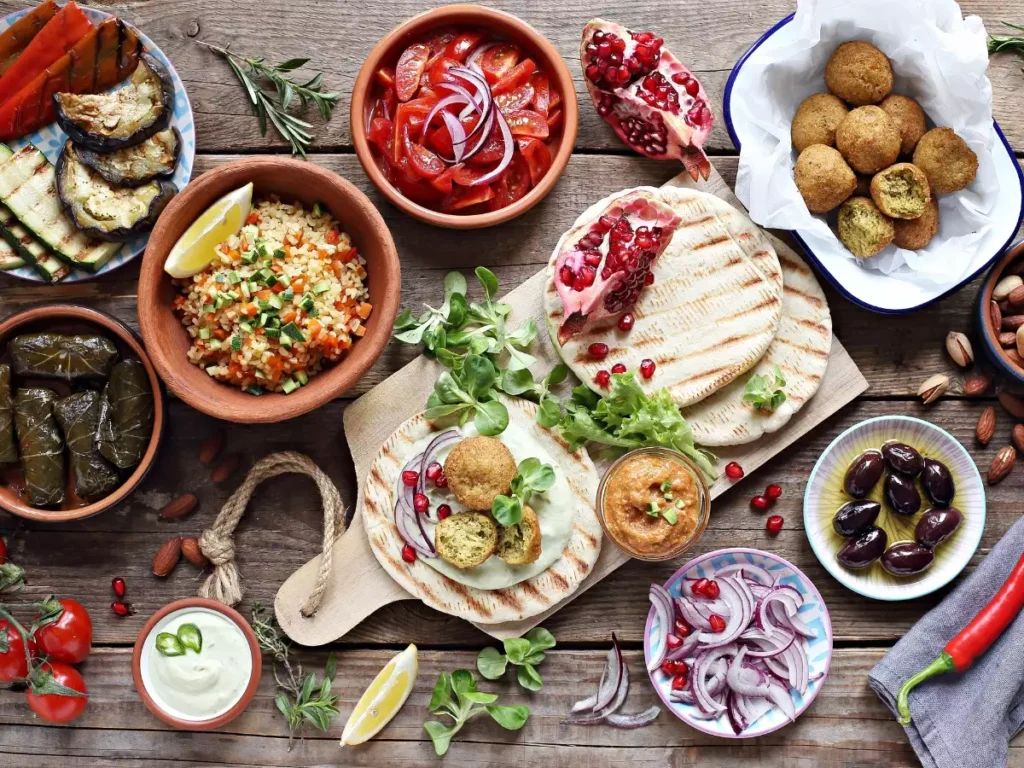
Does the Mediterranean diet include Italian food?
Absolutely, Italian food is like the life of the Mediterranean diet party! The Mediterranean diet is all about fresh fruits and veggies, whole grains, olive oil, and a healthy dose of seafood. Italian cuisine fits right in with its love for all those things, especially the use of olive oil, fresh produce, and, of course, seafood in coastal areas. From a light and zesty Caprese salad to a hearty seafood risotto, Italian dishes showcase the essence of the Mediterranean diet. So, yes, Italian food not only crashes the Mediterranean diet party but also dances on the main stage!

Is pasta considered Mediterranean food?
You bet it is! Pasta is a staple in the Mediterranean diet, especially in Italian cuisine. It’s all about how you serve it, though. Mediterranean-style pasta dishes are usually loaded with fresh veggies, a splash of olive oil, and sometimes seafood, keeping things light and healthy.
Think whole wheat pasta tossed with cherry tomatoes, basil, olives, and a drizzle of olive oil. Pasta in the Mediterranean diet is far from that heavy, creamy stuff; it’s more about celebrating simple, fresh ingredients. So, yes, pasta definitely has a VIP seat at the Mediterranean food table.
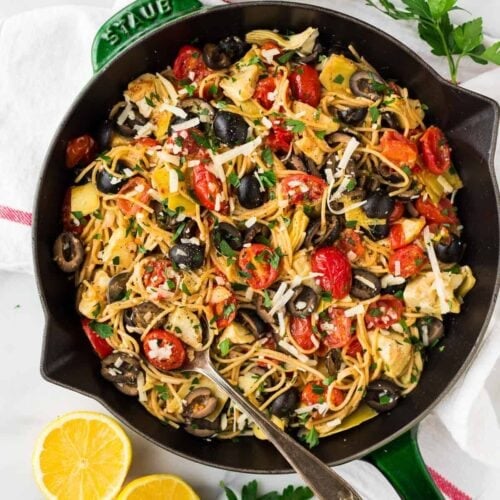
The Essence of Mediterranean Cuisine
Mediterranean cuisine is characterized by its use of fresh vegetables, fruits, whole grains, nuts, legumes, olive oil, and lean proteins like fish and poultry. This diet reflects the eating habits of people living in countries bordering the Mediterranean Sea, including Italy, Greece, Spain, France, and parts of the Middle East and North Africa. The unifying factor of Mediterranean cuisine is not just the ingredients but also the emphasis on simplicity, seasonality, and locality.
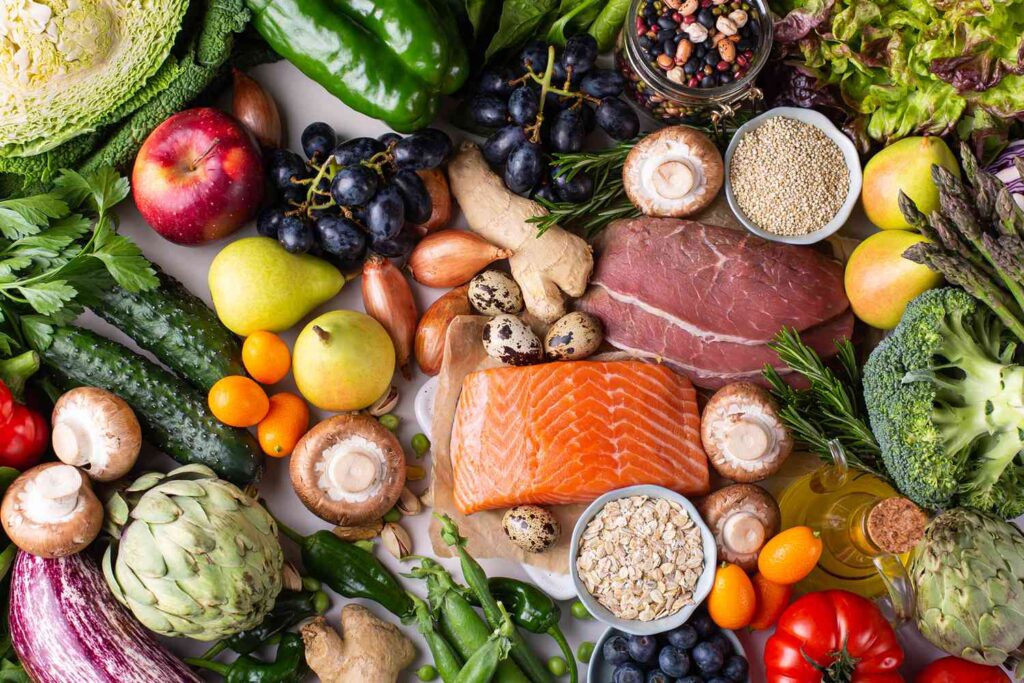
Italian Cuisine: A Pillar of Mediterranean Food
Italian cuisine, with its diverse regional dishes, embodies the heart and soul of the Mediterranean diet. From the sun-drenched hills of Tuscany to the bustling streets of Naples, Italian food is a testament to the country’s rich cultural and agricultural heritage. Key ingredients like tomatoes, olive oil, garlic, basil, and pasta play a central role in Italian dishes, showcasing the country’s love for hearty, flavorful meals that bring people together.

Regional Diversity within Italian Cuisine
One of the most remarkable aspects of Italian cuisine is its regional diversity. Northern Italy, with its butter-rich dishes and hearty risottos, contrasts sharply with the olive oil-drenched vegetables and grilled seafood of the South. This diversity is a reflection of Italy’s varied geography, climate, and history, contributing to the rich tapestry of flavors and techniques that define Italian cooking.
How Italian Cuisine Differs from Other Mediterranean Foods
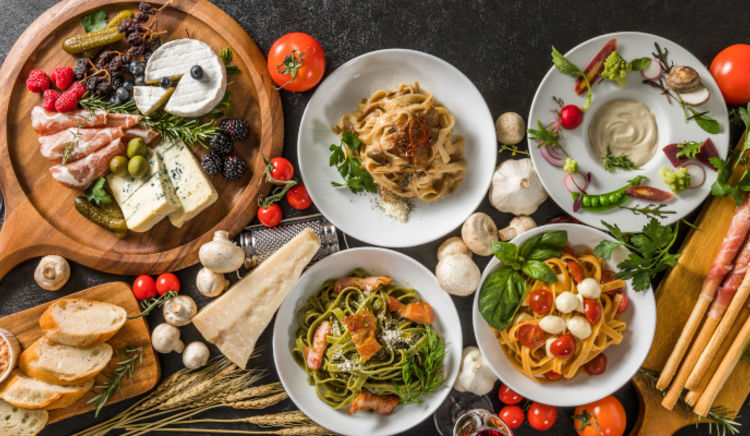
While Italian food shares many ingredients and principles with other Mediterranean cuisines, it distinguishes itself through its pasta varieties, cheese production, and wine culture. Italian pasta, with its endless shapes and sizes, is a culinary art form, each designed to hold sauces in a unique way. Furthermore, Italy’s cheese-making tradition, featuring iconic cheeses like Parmigiano-Reggiano, Mozzarella di Bufala, and Gorgonzola, adds depth and richness to its dishes. Lastly, Italy’s wine culture, deeply intertwined with its culinary practices, enhances the dining experience, celebrating the country’s diverse terroirs.
Health Benefits of Mediterranean and Italian Diets
The Mediterranean diet, including its Italian variant, is renowned for its health benefits. Rich in monounsaturated fats from olive oil, high in fiber from whole grains and vegetables, and low in processed foods and red meat, this diet has been linked to reduced risks of heart disease, diabetes, and certain cancers.
The Italian emphasis on fresh, seasonal ingredients and balanced meals contributes to this healthful eating pattern, promoting longevity and well-being.

Exploring the Flavors of Italy:
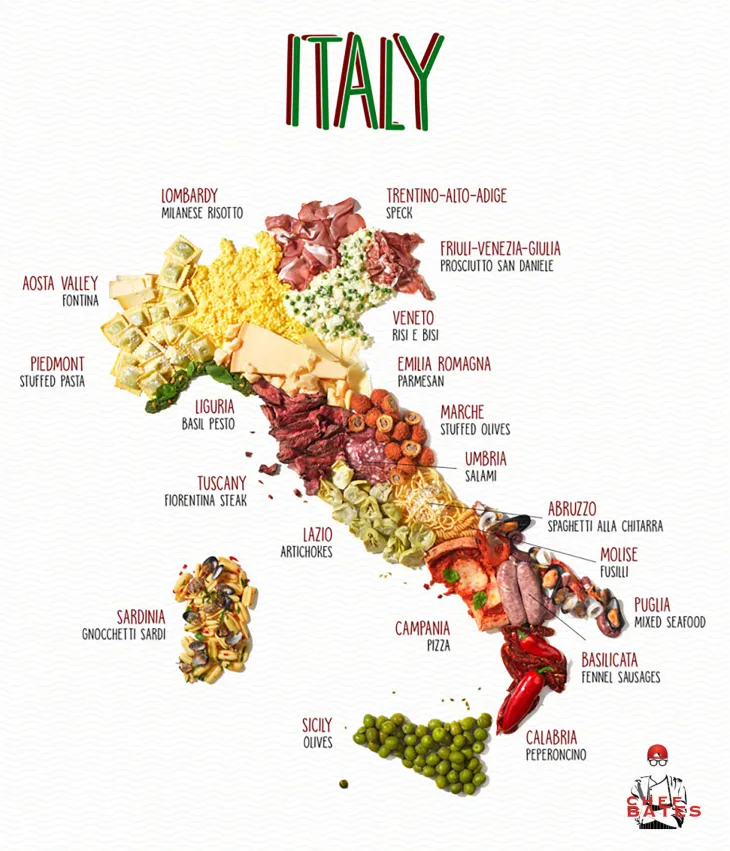
To truly appreciate the diversity and richness of Italian cuisine, one must explore its regional specialties. From the pesto of Liguria to the truffles of Umbria, the flavors of Italy are a testament to the country’s love for food that is both simple and profoundly satisfying.
Each dish tells a story of place, tradition, and family, inviting diners to embark on a culinary journey that is as varied as it is delicious.
So, Is Mediterranean food Italian?
Mediterranean cuisine extends far beyond just Italian food, encompassing the diverse culinary traditions of countries surrounding the Mediterranean Sea. This includes Southern Europe, North Africa, and the Middle East. While Italian dishes like pizza and pasta are well-known, Mediterranean cuisine also features Greek gyros, Spanish tapas, and Middle Eastern falafel and hummus.
The unifying elements are the use of olive oil, fresh produce, fish, grains, and a variety of herbs and spices. This creates a distinct culinary identity characterized by fresh, high-quality ingredients and simple, yet rich and diverse flavors, reflecting the region’s cultural variety.
Conclusion
Italian cuisine is an integral part of the Mediterranean diet, celebrated for its emphasis on quality ingredients, regional diversity, and health benefits. While it shares many similarities with the culinary traditions of its Mediterranean neighbors, Italian food stands out for its unique pasta, cheeses, and wine culture. By embracing the simplicity, seasonality, and communal spirit of Italian cooking, we can all enjoy a taste of the Mediterranean, no matter where we are in the world.
